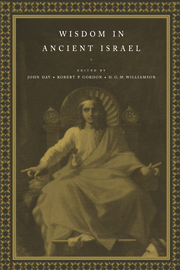Book contents
- Frontmatter
- Contents
- List of abbreviations
- Introduction
- Part 1 The ancient near eastern setting
- Part 2 Old Testament and Apocryphal texts
- Part 3 Themes
- 17 Were there schools in ancient Israel?
- 18 The trees, the beasts and the birds: fables, parables and allegories in the Old Testament
- 19 The personification of Wisdom
- 20 Wisdom and the goddess
- 21 Wisdom at Qumran
- 22 The interpretation of wisdom in nineteenth-century scholarship
- 23 Wisdom and Old Testament theology
- Biographical note: John Adney Emerton
- Bibliography of the works of John Adney Emerton
- Indexes
- Principal biblical and apocryphal references
21 - Wisdom at Qumran
Published online by Cambridge University Press: 16 October 2009
- Frontmatter
- Contents
- List of abbreviations
- Introduction
- Part 1 The ancient near eastern setting
- Part 2 Old Testament and Apocryphal texts
- Part 3 Themes
- 17 Were there schools in ancient Israel?
- 18 The trees, the beasts and the birds: fables, parables and allegories in the Old Testament
- 19 The personification of Wisdom
- 20 Wisdom and the goddess
- 21 Wisdom at Qumran
- 22 The interpretation of wisdom in nineteenth-century scholarship
- 23 Wisdom and Old Testament theology
- Biographical note: John Adney Emerton
- Bibliography of the works of John Adney Emerton
- Indexes
- Principal biblical and apocryphal references
Summary
Little has been written so far on wisdom at Qumran. A number of essays have been devoted to the ‘Wiles of the Wicked Woman’ (4Q184), Lichtenberger analysed 4Q185, and W. Lowndes Lipscomb and J. A. Sanders contributed a short article on ‘Wisdom at Qumran’ to the Festschrift for S. Terrien. The latter authors have suggested that although many of the terms for ‘wisdom’ and ‘insight’ common in the biblical sapiential literature are found in the writings of the Qumran community, there is no undisputed evidence that its members ever composed wisdom texts.
In this essay, written in honour of my dear friend John Emerton, I do not propose to treat the complicated question how to draw the borderline between chokmatic and non-chokmatic compositions in the literature found at Qumran. On this problem, I adopt a pragmatic standpoint, the more so because the form-critical rules usually adopted in the case of Old Testament wisdom texts are to a large extent not applicable to similar early Jewish writings or parts of them. Consequently, I consider those Qumran texts as chokmatic whose contents include enough elements that remind us of Old Testament sapiential writings. This may seem a somewhat unsatisfactory mode of delimitation, but its advantage may be that I do not consider a text as chokmatic which others want to assign to another literary category, e.g. a valedictory address or an admonition pertaining to the eschaton.
Not only in the canonical literature of the Old Testament, but also in the writings of early Judaism (including Qumran), wisdom is a term with multifarious meanings.
- Type
- Chapter
- Information
- Wisdom in Ancient Israel , pp. 244 - 256Publisher: Cambridge University PressPrint publication year: 1995
- 3
- Cited by

